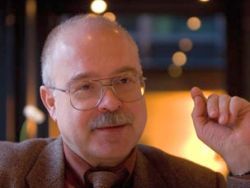
Dmitriy Trenin
Dmitriy Trenin, director of the Carnegie Moscow Center, has been with the center since its inception. He also chairs the research council and the Foreign and Security Policy Program.
The news are dominated by the confrontation between Russia and the West over Ukraine. Unfortunately, there is quite a lot of nonsense repeated in the American newspapers over and over again. It’s just another reminder about the care we, social scientists, must take when we use media as empirical sources. Read Distorting Russia: How the American media misrepresent Putin, Sochi and Ukraine by Stephen F. Cohen in the Nation for details, and check also this piece by Dmitri Trenin of the Carnegie Endowment for International Peace.
As we stressed on many occasions, the Social Evolution Forum focuses on science (see Keeping Science and Ideology Apart). We do not take partisan sides – whether it is Democrats versus Republicans, the United States versus Russia, or different factions versus each other within Ukraine. Nevertheless, evolutionary science has some interesting insights to offer about the conflict. In particular, there is much discussion among the American and European political elites about what can be done in practical terms. The discussion is focusing on economic sanctions, as is described in this Reuters article, U.S. and EU marshal economic tools to punish Russia.
The problem with this approach is that none of these measures would have any effect on the Russian policy. The primary motivating factors behind the Russian push to bring Crimea within its orbit (either by ensuring its independence from Kiev via deep autonomy – de facto independence – or by an outright annexation) are not economic, and so economic sanctions will have no effect. They are, first, geopolitical and, second, something that we could call following Scott Atran "sacred values.”
Alexander Deyneka: Defense of Sevastopol (1942). Source
Apart from a small and largely powerless pro-Western opposition, the Russian political class is solidly behind Putin on the issue of Ukraine. The great majority of politicians from all parties represented in the Duma (the Russian Parliament) and most political commentators perceive the post-Soviet history of NATO-Russia relations as a relentless drive by NATO to encircle and isolate Russia; a kind of the "winner-take-all” policy. Russia has already went to war in Georgia in 2008 to indicate that are some "red lines” that it will not tolerate crossing. The stakes are even higher in Ukraine – a much larger country inhabited by millions of Russians and Russian-speaking Ukrainians. Very importantly, Crimea is also the home of the Russian Black Sea fleet in Sevastopol. Crimea, thus, is of huge geopolitical importance to Russia, serving as an "unsinkable aircraft carrier” and the only naval port open year-around. Their fears may be exaggerated, but the political class perceives returning Crimea to the Russian orbit as a necessary condition for retaining the status of a great power, which is for many an existential issue.
If the geopolitical aspect has been discussed by many American commentators, the second fact, sacred values, has been completely ignored. But it shouldn’t be, because in many ways it is of the overriding importance.
Crimea is of huge symbolic significance to the Russians. As I described in my book War and Peace and War, for centuries the Crimean Tatars were a dagger in the Russian southern ‘underbelly’ – raiding, looting, killing, and enslaving millions of Russians (‘millions’ is not an exaggeration).
Alexander Potapov: On the Steppe Frontier. Source
It took three centuries for Russia to push the steppe frontier south to the point when it finally encompassed Crimea. Crimea was ceded to Russia in 1774 by the Treaty of Küçük Kaynarca.
During the nineteenth and twentieth centuries Crimea, and particularly Sevastopol (founded by Catherine the Great), were associated with resistance against external enemies – during the Crimean War and World War II (in both cases, Russian historical books refer to the "heroic defense of Sevastopol”). When the Soviet Union collapsed, the great majority of Russians felt that it was a great mistake to allow Crimea to be retained by Ukraine (it was gifted to Ukraine by the Communist leader Khruschev in 1954 as "a token of eternal friendship”). So a return of Crimea to Russia is perceived as righting a historical wrong. Crimea to Russians is what Scott Atran calls a "sacred value.”
Siege of Sevastopol by Franz Roubaud. Source
Threatening economic sanctions when sacred values are in balance is counterproductive. Such a threat is actually much more likely to stiffen the resolve to defend them at all costs.
As a result, Putin’s policy towards Ukraine is very popular among the Russians, which includes, importantly, both his support group among the elites (the so-called siloviki, recruited from the military and intelligence agencies) and just common people. Judging from the comments in the blogosphere, he is regaining support even among many people who have been quite critical of the "Putin regime” because it is broadly perceived as rather corrupt and primarily serving bureaucrats and their businessmen cronies. These people are very supportive of "returning Crimea to us.” Some even say that if Putin returns Crimea to Russia, they will forgive him all.
If Putin retreats on this issue, on the other hand, he will lose all credibility among large swaths of the Russian population. And everything suggests that Putin is very careful to retain and nurture his high approval rating. So a recent jump in the approval rating from 60.6 percent in January to 67.8 percent in March suggests that he would be quite immune to the threats of economic sanctions.
Max Presnyakov: On the Steppe Frontier. Source
=======================================================
Notes on the Margin: I am at the end of making the transition back home after a stint as visiting professor at Aarhus University. Thanks to all who have left comments while I was in transition, and my apologies for not responding to them.







_jpg/250px-ElbeDay1945_(NARA_ww2-121).jpg)





